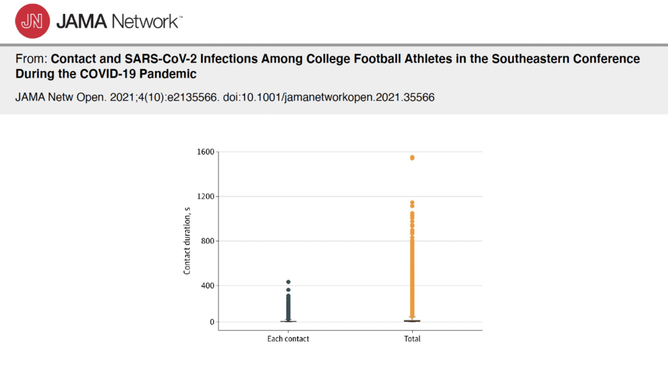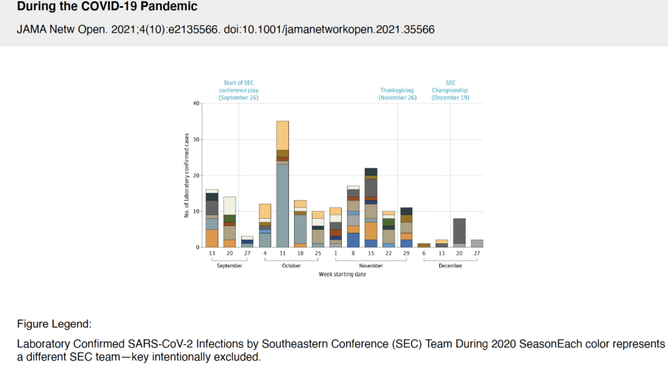Report: Playing College Football Didn't Spread COVID Among Athletes
A study published Friday suggests playing college football games did not contribute to COVID-19 spread among players in the SEC last year with the conference's testing and mitigation procedures in place.
The study, published by JAMA Network Open, analyzed COVID-19 contact exposures and transmission among opposing team players during college football games as the COVID-19 pandemic surged.
"In this analysis of US college athletes playing regular season SEC football games during the COVID-19 pandemic, no instances of in-game transmission was found," the study's discussion reads. "This is similar to the ... The SEC early-season peak SARS-CoV-2 incidence also mirrors the NFL experience. The rigorous SEC testing regime makes it unlikely that infections, even if asymptomatic or early in the infection period, went undetected."

Courtesy of Jama Network Open's study.
The SEC implemented a system for remote sensing and automated logging of interactions and proximity between players wearing tracking devices, and researchers from Texas A&M University used the data from the nearly 1,200 SEC football players between Sept. 26 and Dec. 19, 2020, for the study.
The players had wearable sensors that could determine what kind of close contact they had during the game, and the athletes had PCR COVID tests three times a week during the season, per SEC COVID protocols. If any players or coaches tested positive, there were strict isolation and quarantine rules.
Within that time frame, there were a total of 109,762 opposing-player interactions over 64 regular-season games, the study found.

Courtesy of Jama Network Open's study.
In all, 138 of the 1,190 players tested — just under 12% — COVID positive, 18 of whom tested positive — or about 1.5% — within 48 hours of playing in a game, the study reads.
The study suggests the conference's regular testing and the strict isolation and quarantine rules kept the majority of players who got sick off the field.
Contact tracing revealed the 18 players had interactions with opponents lasting 1 to 364 seconds — median, 12 seconds — with no contacted athletes testing positive over the following 14 days. The study states none were considered close contact exposures under the current CDC definition.
"Despite 12% of athletes testing positive for SARS-CoV-2, only 18 had competed during the preceding 48 hours, and no downstream infections to members of the opposing team were apparent," the study reads. "Actual contacts were exceedingly brief, even when accumulated over an entire game. In-game close contact was rare, not associated with SARS-CoV-2 transmission, and no CDC defined close contact exposures were observed."
The full study, "Contact and SARS-CoV-2 Infections Among College Football Athletes in the Southeastern Conference During the COVID-19 Pandemic," can be read here.
Signup for OutKick VIP by clicking here, and keep up with all OutKick's latest betting info by clicking here.
New FanDuel Sportsbook users can make their first bet risk-free up to $1,000. If the bet loses, the FanDuel Sportsbook will refund you in site credit. New users can lock in this offer NOW by clicking this link.
Follow Meg Turner on Twitter @Megnturner_ and Instagram @Megnturner.